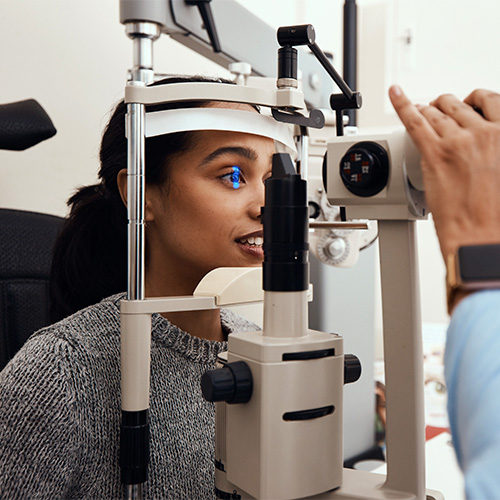What is a Diabetic Eye Exam? Why It’s Essential for Eye Health

Diabetes affects the body’s ability to manage blood sugar, and high blood sugar levels can damage blood vessels throughout the body, including those in the eyes. Over time, this can lead to conditions such as:
- Diabetic Retinopathy: This occurs when high blood sugar damages the blood vessels in the retina, leading to leakage, swelling, and even vision loss. It’s one of the most common causes of blindness in adults.
- Diabetic Macular Edema (DME): Often a result of diabetic retinopathy, DME involves the buildup of fluid in the macula (the part of the retina responsible for detailed vision).
- Cataracts and Glaucoma: People with diabetes are at a higher risk of developing cataracts and glaucoma, which can further impact vision.
What to Expect During a Diabetic Eye Exam
A diabetic eye exam is similar to a routine comprehensive eye exam but includes specific tests to check for signs of diabetic eye disease. Here’s what you can typically expect:
Review of Medical History: Your eye doctor will ask about your diabetes management, including your blood sugar control, medications, and any symptoms you may have noticed, such as blurry vision.
Visual Acuity Test: This test assesses your ability to see clearly at various distances and can detect early changes in vision.
Pupil Dilation: To get a clear view of the retina, your eye doctor will likely use drops to dilate (widen) your pupils. This allows for a detailed examination of the retina and optic nerve.
Examination of the Retina and Optic Nerve: Using specialized tools, your eye doctor will examine the retina, optic nerve, and blood vessels for signs of damage or abnormality.
Optical Coherence Tomography (OCT): In some cases, an OCT scan may be used to capture high-resolution images of the retina’s layers. This can help detect even subtle signs of diabetic retinopathy or macular edema.
How Often Should You Get a Diabetic Eye Exam?
The American Diabetes Association recommends that people with diabetes have a comprehensive dilated eye exam at least once a year. However, your doctor may suggest more frequent exams if you have existing eye complications or your diabetes is not well-controlled.
How Can a Diabetic Eye Exam Protect Your Vision?
Regular diabetic eye exams enable early detection of eye diseases, often before symptoms are noticeable. Early detection allows for proactive management, which may include:
- Improved Blood Sugar Management: High blood sugar is a key factor in diabetic eye disease. If changes are detected, it may be a sign to adjust diabetes care routines.
- Treatments to Prevent Vision Loss: Depending on the findings, your doctor may recommend laser treatments, medication injections, or other treatments that can prevent or slow vision loss.
Take the First Step in Protecting Your Vision
At Bonney Lake Family Eye Care, we’re here to help our diabetic patients protect their vision and maintain healthy eyes. If you have diabetes, scheduling a yearly diabetic eye exam is essential to ensure any changes are caught early and managed effectively.
Your eyes deserve the best care. Schedule your diabetic eye exam today and take a proactive step in safeguarding your vision.




